How to keep your brain sharp throughout life?
Imagine your life after 40s, you forget where your belongings are, confuse with phone numbers and addresses, cannot indulge in serious decisions due to impaired judgment, no more recognize old friends.
Frustrating isn’t it?
Brainpower decreases with age – is not a fact but a myth. Cognitive skills can decline at any age and is scientifically proven.
There are various neurological illnesses that can cause significant memory loss at a young age. Health conditions like diabetes, stress, and depression can also damage mental functioning very early.
Related: 8 Daily Habits That Are Secretly Damaging Your Brain
Do you know people with anxiety, sleep deprivation, and depression tend to score poorly on cognitive function tests? Good mental health is certainly an important goal to retain brainpower at old age.
How actually brain works is unclear! But, thanks to decades of researches and experiments on how to keep the brain sharp, active and preserve memory.
Here are the best evidence-based strategies for you to keep your brain sharp and young at any age
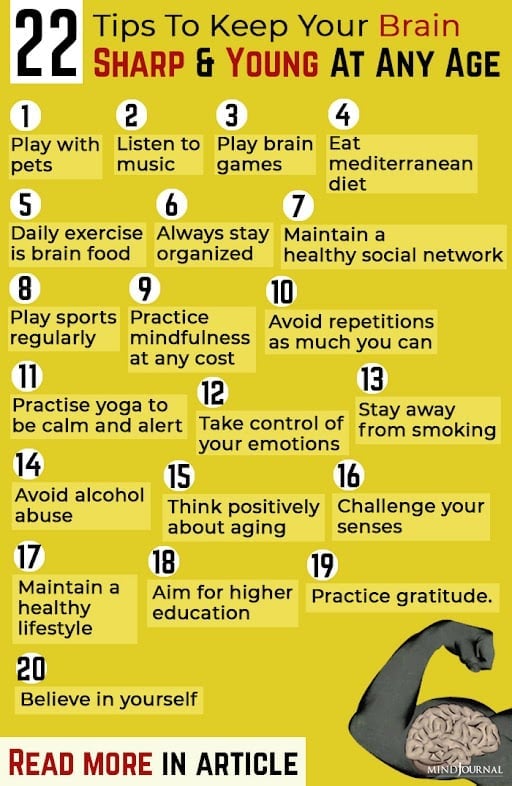
1. Play with pets

Do you know that pets help in normalizing the brain chemistry? Yes, you read it right!
South African researchers showed that spending time with dogs and cats increases the level of beta-endorphins in the human brain. This neurochemical is a natural pain killer released in our body. Petting dogs double dopamine and serotonin. These hormone makes us feel good and relieve stress and depression.
There is a feedback system that neurochemically, psychologically and behaviorally sets up between you and your pet. We take antidepressants and feel good just because they elevate the level of these neurotransmitters. But pets do that just for free.
Why waste money over antidepressants? Get a furry friend and your sharp brain will never fall short of healthy brain chemicals.
2. Listen to music for a sharp brain

Music acts as a balm on a depressed mind.
Listening to music gives you a sense of pleasure and meaningfulness according to the article published in The British Journal of Psychiatry. Music boosts the level of dopamine, the feel-good hormone brings about the musical-reward experience in the person.
Such pleasure coming from activation of certain brain regions drives the body, lets people communicate, and get moving. Music averts depression even in passive people hardwired to be social.
Music therapy induces sound sleep and decreases insomnia severity. In a study published in the Journal of Brain and Cognition, music was found to restore impaired vision. Scientists say that long term musical training improves visual attention and stimulates other cognitive benefits.
Also read: Music Therapy for depression – how can it heal you?
3. Play Brain games

Get mental stimulation with brain games and reduce your chances of developing Alzheimer’s. Games like Sudoko, solving a puzzle, chess, Qwirkle, Ken Ken, Taboo, and others require a strategy. It promotes critical thinking, memory, concentration, attention, creativity, and can prevent mild brain traumatic injury.
How does this work? Scientists believe that such mental stimulation encourages the brain to forge and maintain new neuron connections, an ability that usually diminishes with age.
You can keep your brain sharp at any age by playing at least one of these games on a daily basis.
4. Eat Mediterranean diet

Eating a Mediterranean diet improves longevity, memory, cognition function and brain volume. This type of diet comprises green vegetables, whole grains, fish, nuts, legumes, fruits, unsaturated oils, moderate intake of alcohol, and plant source of proteins.
Research shows that the Mediterranean diet promotes healthy aging, and reduces the risk of certain cancers, Alzheimer’s, dementia, Parkinson’s disease, and depressive symptoms in older age. These results are based on Brain Magnetic Resonance Imaging Measures in young and older adults.
Do you want to age-proof your brain? Then savor Mediterranean diet, a simple, cost-effective solution!
5. Exercise daily to keep your brain sharp

According to Michelle Ploughman, the clinical research scientist “exercise is brain food.”
Research supports that daily exercise whether mild or intense protects the brain and heart. Even brisk walking for 30 minutes can lift your spirits. Physical exercises enhance memory, creativity, concentration and help in speedy thinking.
Regular exercises can beat stress, anxiety and long-term depression according to the American Psychological Association. It can also improve the connection between brain cells and develop new nerve cells. As a result, you can have a sharp brain, and keep your brain efficient and adaptive even when aging.
What else?
Exercises also decrease the risk of cancer and Alzheimer’s disease and other neurodegenerative disorders associated with age. Be physically active to retain your brainpower always!
Related: 15 Art Therapy Exercises to Control Your Mind and Channel Your Emotions
6. Stay organized
If you want to avoid forgetfulness (like unable to recall where you kept your car keys or spectacles) at your old age, then you must stay organized.
The best way is to take advantage of planners, to-do lists, calendars, shopping lists, address books, and file folders. Why not keep your information accessible? It’ll help you better concentrate on learning and remembering important matters. You can make your life easier by designating a place at home for your keys, diaries, glasses and other items you use often. An organized lifestyle boosts brainpower and productivity.
Clear the clutter!
7. Maintain healthy social network
Do you know that social isolation carries the same health risks as obesity, physical inactivity, and smoking?
In-person socialization is more important than making friends on Facebook. Because online conversation is all about what is cool and what is not socially relevant. Modern conveniences and technology give pleasure!
But, hanging out with friends and attending parties are powerful stress-busting medicines according to Stanford University health psychologist Kelly McGonigal.
Loneliness does as much damage as 15 cigarettes a day.
Stronger your social ties, lower the risk of dementia, memory loss, and longer life expectancy. You can ensure regular social activity through volunteering for a cause, job, engaging new hobbies, joining groups of similar interests, traveling and so on.
8. Play sports regularly
Playing sports gives you a quieter and healthier nervous system. A new study from Northwestern University showed that athletes can process information and situation better than non-athletes.
Even if you don’t aim to be an athlete, engaging in some sort of sports like badminton or football or swimming on a regular basis can make your brain more plastic. It will help your brain to develop new neurons, connections, and reorganize its neural networks.
But protect your head! Moderate to severe head injuries, even without diagnosed concussions, increase the risk of cognitive impairment.
9. Practice mindfulness
Mindfulness helps you change your mind for the better and keep your brain sharp. The pre-frontal cortex is the area of your brain responsible for things like planning, problem-solving, and controlling your emotions. The grey matter in this area can become thicker after practicing mindfulness, showing increased activity in these areas of thought.
Read on to know How Mindfulness Can Improve Your Overall Mental Health
10. Avoid repetitions
Repeating something many times in a short period slows your brain. Even if you’re studying for an exam, restudy the essentials after an increasingly longer period of time. You can also space it out as once an hour, or every few hours, and then every day. You can master complicated information by spacing out periods of study.
But repetition is necessary when you want to learn something new.
When you hear, read or think something new just say it loud or write it down. That way, you reinforce the memory or connection. For example, If you’ve just met a stranger, ask his or her name and use it when you speak. “So, John, where is your hometown?”
11. Meditate to keep your brain sharp

Regular meditation can make your brain younger than actual age. In a new study of regular meditators and non-meditators, scientists found “at the age of 50, brains of meditators were estimated to be 7.5 years younger than those of controls”. It was also observed by various other researchers that meditation prevents loss of brain cells a pattern associated with aging.
Meditation is one of the scientifically proven ways to combat stress, pain, anxiety, and depression. Guess what? You don’t need particular spiritual beliefs to meditate.
Are you ready to try?
Also read: 7 Informal Meditation Practices: How To Meditate Without Meditating
12. Yoga is the door to sharp brain

Even a single class of yoga makes you feel relaxed and stronger. Why?
Yoga reduces the level of cortisol the stress-causing hormones in our body and increases the sense of well-being and self-control. Hence, medical practitioners recommend yoga for improving mood and emotional regulation for both healthy and individuals diagnosed with anxiety and depression.
The deep breathing and meditation work on the hypothalamic-pituitary-adrenal axis of the brain, which controls your sympathetic nervous system (the fight or flight response that keeps your body cued up) as well as the parasympathetic nervous system (this tells you to chill out). It enhances mindfulness and helps you live in the present.
The ultimate goal of yoga is to be calm and alert without going to flight or fight response. When your body is calming down, your brain gets the message that all is well. Daily yoga keeps your brain sharp at any age.
Related: Which Kind Of Yoga Should You Practice Based On Your Lifestyle?
13. Take control of your emotions

You can’t control the things that happen to you but you can always control how you react to your emotions. You need to put 100% concentration on things that can make a big difference in your life. It will help you get rid of fear, helplessness, exhaustion, sleeplessness, and insecurities.
Control your emotions to move forward. If you are stuck or unable to address them, you will lose your focus and brain efficiency.
Start by being honest about your feelings and thoughts and it will foster a deep trust and inner peace. You’ll find it easier to channel the emotion into producing the behavior that you want. Identify and label your emotions as you experience them and associate words with what you are feeling. Hence, you can relax and find out what’s behind your emotions.
14. Don’t smoke
Do you know smoking harms almost every organ of our body including the brain?
Nicotine in cigarettes is as addictive as heroin. Excessive smoking leads to the development of extra nicotine receptors in the brain to accumulate a large dosage of nicotine. When the brain stops getting this substance, one feels irritation, anxiety, and strong cravings according to the National Institute of Health.
According to an article published in Neuropsychopharmacology Cigarette smoking also increases the risk of –
- major depressive disorder,
- alcohol consumption,
- poor cognitive function and forgetfulness
- increase impulsivity
- Dementia
- Alzheimer’s disease
- Multiple Sclerosis
Avoid tobacco in every way and keep your brain sharp and young!
15. Avoid alcohol abuse
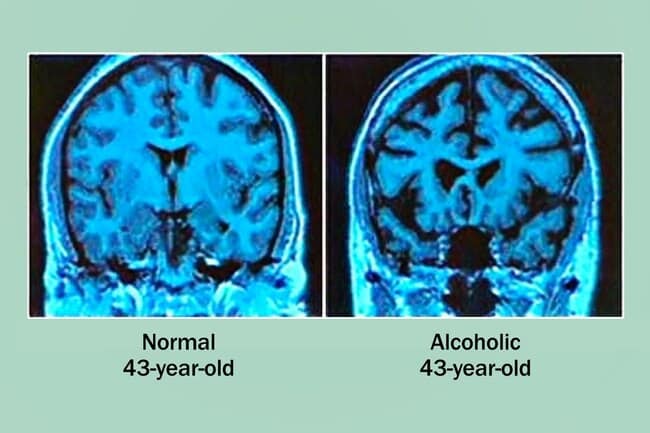
According to the National Institute on Alcohol Abuse and Alcoholism, excessive alcohol consumption has various damaging effects on the brain including blackouts and memory lapses, deficiency in thiamine, brain shrinkage and Wernicke–Korsakoff syndrome (which is characterized by the paralysis of the nerves regulating the ey movement, mental confusion, and difficulty with muscle coordination).
Alcohol abuse is also a major risk for several brain disorders including dementia. Experts recommend a maximum of two drinks a day.
16. Think positively about aging
You must have heard of Ruth Ginsberg (80 years old), the famous super ager. She is popular as Supreme Court justice, a feminist icon, and a whip-smart thinker. Now, why do you think her brain works so incredibly even in the 80th decade of her life? Experts say that she is all optimistic about her life and about aging. That is her only secret to happiness and good health.
According to Joel Kramer, director of neuropsychology at the UCSF Memory and Aging Center, people who are optimistic age better. It ensures that your sharp brain will function at its best in your golden years.
17. Challenge your senses for a sharp brain

When learning something, it is beneficial to use all your senses. The more of your brain will be involved in retaining memory.
In one experiment, adults were shown a series of emotionally neutral images, each presented along with a smell. But, the participants weren’t asked to remember what they saw. Later, they were shown a set of images, this time without odors. When the participants were asked to indicate which they’d seen before, most of them recalled images associated with odor.
The reason was the activation of the main odor-processing region of the brain when people observed objects originally paired with odors. This helped them recognize images even though the smells were no longer present. Challenge your senses to keep your brain sharp at any age.
18. Build healthy relationships
Are you well-connected to family members and friends? Then congratulations. You’re going to be mentally happy and live longer.
According to Robert Waldinger, a healthy and positive relationship with closed ones sharpens your memory. He found that people who count on their relationships at times of need can enjoy a longer-lasting ability to remember things. On the other hand, people who could not count experienced poor memory very early.
So, replace your screen time with people time and protect your brain.
19. Higher education
High educational attainment is associated with later ages of peak cognitive functioning, according to UC Berkeley researchers. People with higher education can stave off age-related cognitive decline.
Why not utilize your free time in learning new stuff online? Advanced education not only keeps memory strong but gets you in the habit of being mentally active. Learning anything new challenges your brain stimulates the formation of new brain cells.
Schooling is not just to impart knowledge. Higher education is a wonderful opportunity to sharpen core cognitive skills.
20. Practice gratitude

We often complain about things missing in our life. But, how many times do you actually thank the universe for all the good things in your life?
Gratitude not only makes you optimistic but slows the aging of the brain, the latest science suggests based on functional MRI studies.
Practicing gratitude that is being thankful and ready to appreciate the positive in your life literally changes the molecular structure of the brain, according to UCLA’s Mindfulness Awareness Research Center. It keeps the gray matter functioning and makes us healthier and happier. This holds true for people with poor mental health as well.
In a study of 300 university students with anxiety and depression, groups of students who wrote gratitude letters reported better mental health within four weeks that those who didn’t participate in this exercise.
Show gratitude to keep your brain sharp at any age.
21. Believe in yourself
In an experiment of middle-aged and older teenagers, their performance on memory tasks was worse. Because they were exposed to negative stereotypes about aging and memory. Those who performed well had a positive perception of memory preservation in the old age.
If you think you are not in control of your memory function and only joke about aging, you’re less likely to work on improving your memory skills. Thus, you’re more likely to experience cognitive decline.
Related: 11 Limiting Beliefs That Are Holding You Back In Life
On the other hand, if you believe you can do it and translate the same into practice, you are highly likely to keep a sharp brain.
22. Maintain a healthy lifestyle
A sedentary lifestyle is linked to various chronic diseases like obesity, diabetes, heart diseases and more. Because sedentary behavior involves binge eating and doing nothing productive. Over time your mind and body are sure to decline faster than otherwise.
A healthy active lifestyle is one where you eat well, exercise regularly, have sound sleep, work for more and party hard. There are no shortcuts around these essentials. Such a lifestyle keeps your blood pressure low, controls your blood sugar, cholesterol and weight. It will keep your body and brain sharp and young throughout life.
Related: A Guide to Help You Maintain a Perfect Health and Keep Lifestyle Diseases at Bay
These are power and well-proven strategies to keep your brain sharp and young at any age.
Enjoyed reading the article? Leave a comment below and share it with your friends.

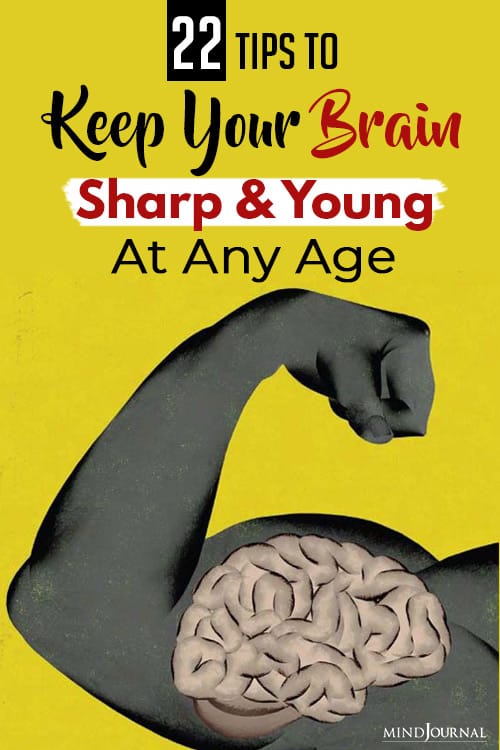
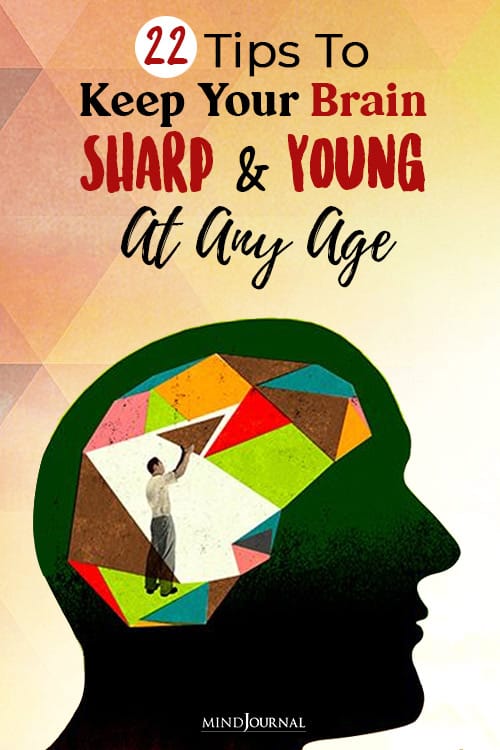

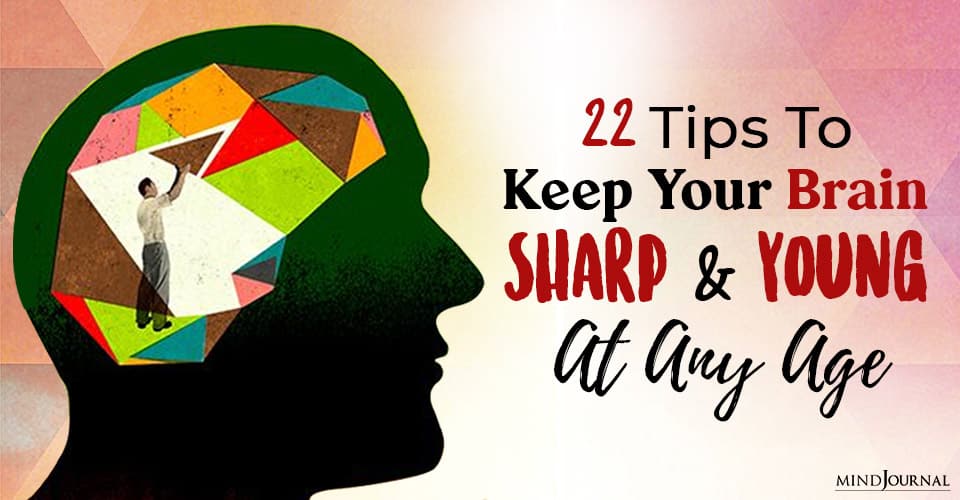







Leave a Reply